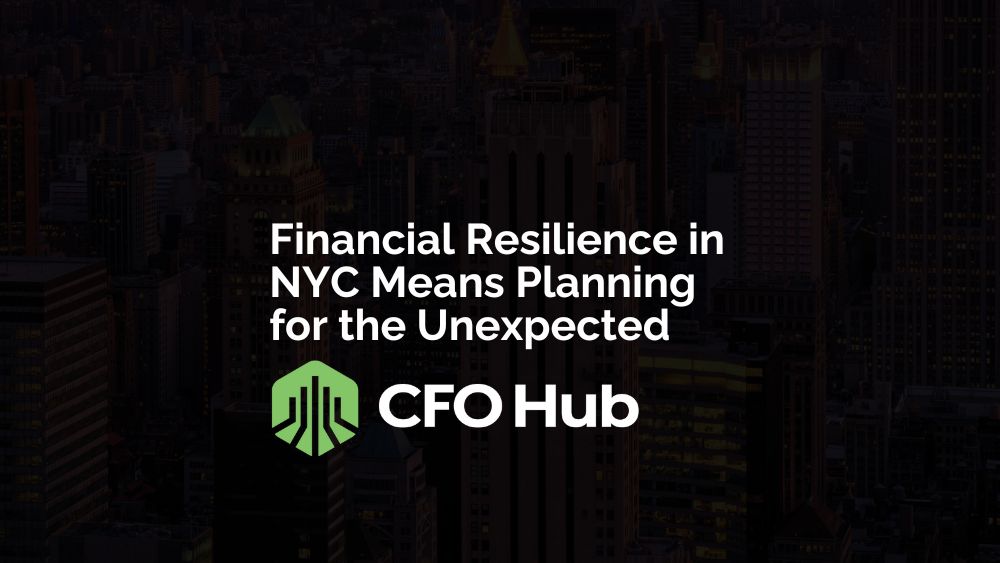Financial Resilience in NYC Means Planning for the Unexpected
New York City is a beautiful mess. It’s a city where you can land a million-dollar deal before your second espresso and still get sideswiped by a delivery bike on your way back to the office. I love it.
But if you run a business here, or manage the finances for one, you already know that the fast pace comes with more than just high rent and competitive hiring. It also brings a legal landscape that’s, let’s say, lively.
Legal liability, including personal injury claims, can knock your entire financial plan sideways. I’ve seen it happen, and it’s why financial resilience in NYC means planning for the unexpected, including lawsuits.
Let me walk you through what I’ve learned, what I wish I’d known earlier, and what I now recommend to every business owner, CFO, and financial lead in the city that never sleeps but occasionally sues.
Land of Opportunity and Litigation
There’s a reason NYC is called the business capital of the world. It’s a magnet for ambition. But with that comes a high volume of legal friction, with many civil cases filed each year, and a significant portion of them related to personal injury.
Sometimes these filings are legitimate. Sometimes they’re…optimistic. But either way, your business finances can take a major hit from one bad fall on a wet floor, a sidewalk slip near your storefront, or an injury involving a third-party contractor working on your premises.
You might think your general liability insurance has got you covered, and maybe it does. But I’ve watched friends and clients discover the fine print only when they’re writing checks to defense attorneys.
The Financial Domino Effect of One Personal Injury Lawsuit
Let me paint a picture of how this plays out from a CFO’s desk:
- An employee or visitor gets injured. They file a claim.
- Your insurance company gets involved. You start digging through surveillance footage and maintenance logs.
- The claim becomes a lawsuit. You need legal representation. If the claim is severe or someone died (it happens), things escalate fast.
- Your team gets distracted. Legal fees start rolling in. You might face temporary closures, reputational damage, or both.
- If you lose or settle, it can cost you six to seven figures, depending on the case and coverage caps. The average settlement and judgment cost of a personal injury claim in 2023 was $134,656.
Now, multiply that by a couple of simultaneous lawsuits, and suddenly your cash flow plan, growth strategy, and employee bonus pool are toast. This city doesn’t mess around when it comes to personal injury payouts.
That’s exactly why, when advising startups and midsize firms, I always emphasize what most founders forget: have a legal contingency fund, and know a solid personal injury lawyer in New York who has your back before you ever need one.
But I’m a SaaS Company, Not a Construction Firm
Doesn’t matter. Even tech companies with no foot traffic aren’t immune.
- Hosting an off-site event? Someone trips.
- An employee slips in the office kitchen? That’s your liability.
- You lease office space with shared facilities? Joint liability.
Also, remote work hasn’t eliminated liability; it just relocated it. If your company hosts co-working days or conferences, you’re still on the hook for any injuries that happen under your banner.
The CFO’s Legal Preparedness Checklist
Here’s what I now consider table stakes if you’re managing finances in NYC.
1. Run a legal audit once a year
This doesn’t have to be scary or expensive. Work with your general counsel or outsource it. You’re checking things like:
- Who can sue you and why?
- What’s your insurance actually covering?
- Are your leases and agreements exposing you?
- Are safety protocols in place and being documented?
If you’re not sure where to start, I recommend pairing this with an outsourced CFO or risk consultant who’s familiar with NYC regulations. Our post on how businesses can proactively manage risks breaks it down nicely, from identification to mitigation strategies that actually work.
2. Maintain a legal response fund
Set aside 3–5% of annual revenue as a legal reserve if you’re in a risk-heavy industry. If you’re not, set aside 1–2%. You’ll sleep better.
3. Have a go-to personal injury attorney
This one is non-negotiable. In the same way you wouldn’t run payroll without a reliable processor, don’t run a physical business in NYC without knowing a reputable personal injury lawyer. The time to research one is before a server drops hot coffee on someone or a customer trips over a rogue cable.
4. Educate your staff
Hold quarterly risk reviews with key team leads. Train your staff on basic liability reduction: wet floor signs, incident logging, and even how to talk to a customer after an accident without admitting fault. A well-trained team is the first line of defense.
5. Have a litigation playbook
Build a clear internal process for:
- Reporting accidents
- Notifying legal counsel
- Handling communications
- Managing press/social media responses
Yes, this is paranoid. That’s also why it works.
Wrapping It Up Before Someone Slips
If you’re in charge of finances for any NYC-based cozy café, fintech startup, or logistics hub, you need to think beyond balance sheets and burn rates. You need to think like someone who’s preparing for chaos, because, in NYC, chaos often comes in the form of paperwork served by a process server.
Trust me; no amount of Excel wizardry can undo a lawsuit that wasn’t budgeted for.
Build your reserves, vet your insurance, train your team, and above all, have a legal ally in your corner. Lawsuits in this city are like subway delays: inevitable, annoying, and very, very expensive, so you better be ready.

